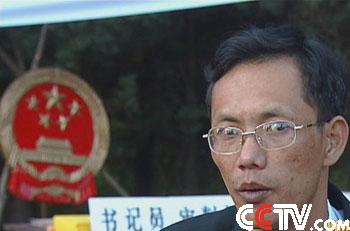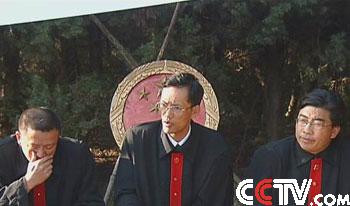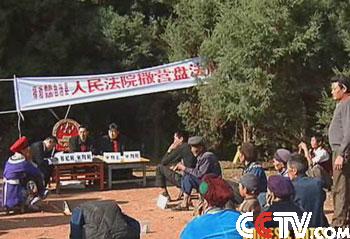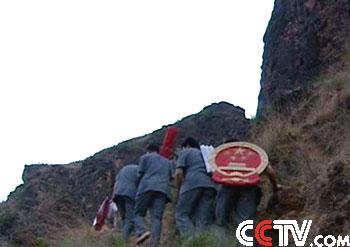Source: CCTV.com
03-14-2007 08:22
Our special coverage dedicated to the ongoing annual session of China's top legislative body and the advisory body. Administering justice over China's vast territory creates challenges in the remote regions. The task is all the more important where traditional culture is entrenched. In today's Across China special, we head to a mountainous area in Yunnan, where the courts have to travel to the people.
Judges in Luquan County are on the move again.
 |
Li Guangxue, presiding judge, Luquan People's Court, Yunnan, said, "We've been carrying the emblem for a long time. We began carrying it in 2000, before that our predecessor also carried it. But back then, the emblem was drawn on an iron sheet."
The national emblem proclaims the only legal branch in Luquan.
Hundreds of villages dot this mountainous region with a population of 160 thousand. The people are all ethnic minorities.
 |
For these judges, travelling across the area is part of the job. The journey by foot is tough, but it's safer than traveling by car.
Late judge Wei Yufa said, "No matter how difficult it is, even if we have to pay costs ourselves, we must perform our duties well. A people's judge should serve the people."
Judge Wei Yufa was killed in a road accident on his way to a hearing.
The steep mountainous conditions were to blame.
But despite the risks, work must go on.
Li Rongwen, deputy judge, Luquan People's Court, Yunnan, said, "In the minority area, local people know little about law. There are many traditions that conflict with the law. The parties won't attend a court. But they like to see the judge in their villages, which is good for resolving the case."
After hours of walking, a temporary courthouse is set up.
Li Guangxue said, "The court is in session. According to the articles in the Civil Law of the PRC, the Sayinpan People's Court of the Luquan Yi and Miao autonomous county today opens its hearing on the divorce case between plaintiff Zhang Jingfen and defendant Li Benlu."
 |
The wife wants a divorce. And for a family feud like this one, judges often seem more like village elders.
Li Guangxue said, "Even if a divorce isn't granted now, if your relationship doesn't improve after mediation, we'll have to issue a divorce in the end. You're at a disadvantage."
In the end, the husband apologizes and the wife drops the suit. This is the best outcome for the judges.
Zhang Yongchuan, judge, Luquan People's Court, Yunnan, said, "Society needs harmony and achieving harmony needs input. As a basic court, most of the cases we encounter come under civil law. If we can solve these cases, we'll contribute something meaningful to the harmony and progress of society."
 |
China has more than 9,000 mobile courts like this one. There may be no roof, and the cases might often seem trivial, but they are vital for a country on the road to the rule of law.
In tommorrow's report in this series, we'll focus on issues of energy and the environment.
Editor:Liu Fang
